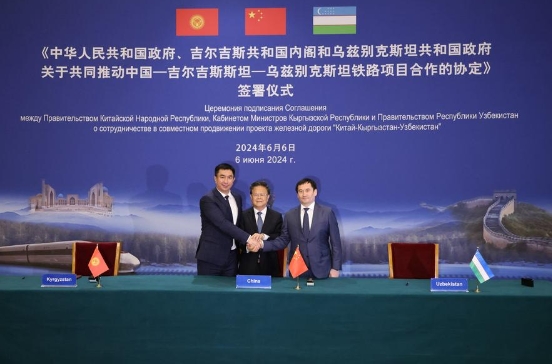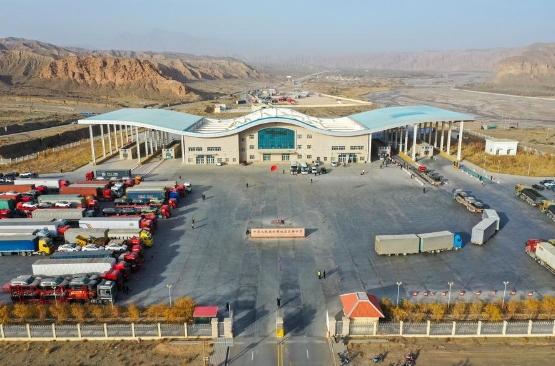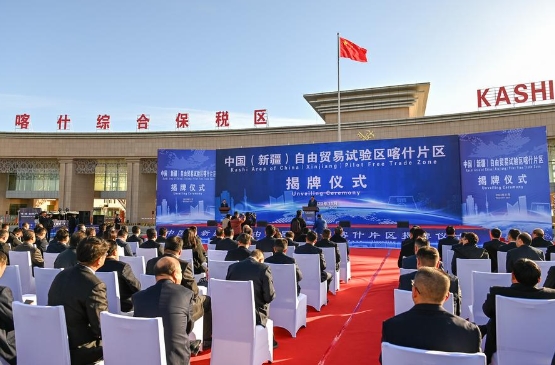World Insights: China-Kyrgyzstan-Uzbekistan railway to greatly boost regional connectivity

A signing ceremony of an intergovernmental agreement on the China-Kyrgyzstan-Uzbekistan railway project is held in Beijing, capital of China, June 6, 2024. (Xinhua/Xing Guangli)
Once the railway is completed and operational, it will not only contribute to the development of Central Asia but also further promote connectivity among neighboring countries and regions.
The China-Kyrgyzstan-Uzbekistan railway reflects the common aspirations of China, Kyrgyzstan and Uzbekistan, and will inject strong momentum into the economic and social development of the three countries, Central Asia and beyond, experts have said.
On June 6, Chinese President Xi Jinping, Kyrgyz President Sadyr Japarov and Uzbek President Shavkat Mirziyoyev congratulated via video link the signing of an intergovernmental agreement in Beijing on the China-Kyrgyzstan-Uzbekistan railway project.
The railway will begin in Kashgar, northwest China's Xinjiang Uygur Autonomous Region, and enter the territory of Uzbekistan through Kyrgyzstan. In the future, it will reach West Asia and South Asia.

This aerial photo taken on Nov. 8, 2023 shows the Torugart port of northwest China's Xinjiang Uygur Autonomous Region. (Xinhua/Ding Lei)
A RAILWAY TO THE SEA
Located in the heartland of the Asian continent, the development of Central Asia has long been constrained by a lack of ports. The railway, once completed, will provide access to the sea and greatly promote connectivity among the three countries and the greater region, experts have said.
Kyrgyzstan, with the help of the railway, will receive a large increase in the passage of goods. In addition, thanks to the railway, Kyrgyzstan, which is located at a geographical dead end, will have access to the sea, said Sergei Ponomarev, president of the Association of Markets of Kyrgyzstan.
The implementation of the project will bring enormous benefits to all project participants and all of Central and South Asia, said Kubanychbek Taabaldiev, a Kyrgyz political scientist and professor of international relations at Ala-Too International University in Bishkek.
A new transit route will be open from East to West, making possible a shorter transit of goods from China to the south and further to the west, said Taabaldiev, noting that "appropriate infrastructure will be created, new jobs are open, and new opportunities will appear for the development of the entire Central Asian region."
The railway is strategically significant to Afghanistan, especially considering its landlocked geographical location, said Jalal Bazwan, a lecturer at Kabul-based Kardan University.
The extension of the railway can connect to the northern port of Hairatan in Afghanistan, providing a direct and efficient route for cross-border trade, thereby attracting overseas investment, which is crucial for a landlocked country like Afghanistan, said Bazwan.
The railway will shorten the time needed to transport Central Asian products to major global markets, facilitate the integration of Central Asia into the global industrial and supply chains, and accelerate the economic development of Central Asian countries, said Yang Bo, a professor of the School of Russian and Eurasian Studies at Shanghai International Studies University.

This photo taken on Nov. 11, 2023 shows the unveiling ceremony of Kashgar Area of China (Xinjiang) Pilot Free Trade Zone in Kashgar, northwest China's Xinjiang Uygur Autonomous Region. (Xinhua/Ding Lei)
A REGIONAL TRANSPORTATION LIFELINE
Once the railway is completed and operational, it will not only contribute to the development of Central Asia but also further promote connectivity among neighboring countries and regions. It could extend to as far as West Asia, the Middle East, and southern Europe, experts have said.
The railway provides an alternative to one of Afghanistan's traditional trade routes through Pakistan, reducing the cost and time of transit for imports and exports, further integrating Afghanistan into regional economic activities, and promoting ties with neighboring countries, said Bazwan.
It cannot only closely connect China with Central Asian countries but also can serve as an important transportation corridor, allowing goods to be further transported to the Middle East, said Abdullah Al-Dosari, the editor-in-chief of Kuwait's Al-Arab newspaper.
Baris Doster, an academic at Istanbul-based Marmara University, said the new railway would enhance commercial, economic, social, cultural and diplomatic relations, strengthening ties among countries in the broader region, including Central Asian countries, China, the Caucasus and Türkiye.
The railway is the realization of a dream of bringing China closer to Central Asia and Europe and will further strengthen and expand the railway network between Asia and Europe, said Mark Cigoj, a Croatian political analyst.
"I am convinced that this is in the interests of both China and the countries of Asia and Europe," Cigoj said.

Customers select commodities at the cross-border e-commerce import and export commodities exhibition and trading center in the comprehensive bonded zone in Kashgar Prefecture, northwest China's Xinjiang Uygur Autonomous Region, Nov. 4, 2023. (Xinhua/Ding Lei)
A SIGNATURE BRI PROJECT
The railway will be a key component of the core transportation network of the Belt and Road Initiative (BRI) and will inject strong impetus into the development of Central Asia and beyond, experts have said.
The completion of the project will help countries along the route to better promote trade and people-to-people exchanges through the high-quality cooperation of the BRI, and to share opportunities brought by China's development, said Hadi Bassam, a researcher at the Iraq Institute for Strategic Studies.
This is another fruitful outcome of South-South cooperation in today's complex international situation, reflecting the urgent need of developing countries to strengthen connectivity and seek coordinated development, said Bassam.
The railway project will shorten freight transport between China, Central Asia and Europe and will be a faster and cheaper alternative to the current land routes, said Amer Tamam, vice editor-in-chief of Egypt's state-run Akhbar newspaper.
Professor Yang Bo at Shanghai International Studies University said the railway will create a cross-border transportation corridor from East Asia and Southeast Asia to Central Asia, West Asia, North Africa, and southern Europe and facilitate the movement of people and goods between Asia and Europe, thus holding great significance in the construction of the international railway network.
Editor:伏娅敏
